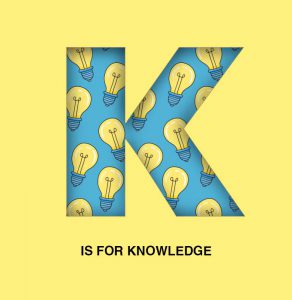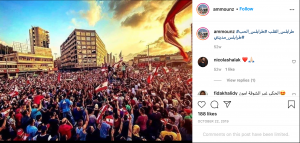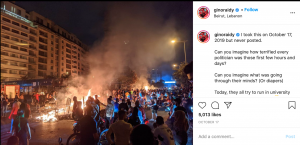The people of Lebanon have been taking to the streets for over a year now to protest for a change in the confessional, sectarian system of government. They echo the deep-felt experience of having no influence on the decisions that affect their lives, described by Thomas Tufte in his work, Communication and Social Change: a citizen perspective.
Tufte explains that the social movements we have seen in the last decade or so bring new vision and perspective to development. They echo both the crisis of development at a global level related to the 2008 financial crisis, and the model of development which characterises society.
This model of development, in part, is due to what Boaventura de Sousa santos suggests is a response to the hierarchy ofknowledge production which gives absolute privilege to scientific knowledge and destroys other forms of knowledge. This includes democratic experiences, because the current model of democracy – where citizens don’t decide the issues, they simply elect decision makers of society – has led to a weak model of democracy and we are seeing marginalised members of society who have no experience of democracy at all. In Lebanon, especially, it is clear that there is no alternative to vote (voter turnout is less than 50%), and parties violate their power. Low intensity democracy is becoming even lower for two reasons:
- When neo-liberalism became the main form of capitalism and globalised itself, these capitalists avoided democratic liberation because they violated local constitutions.
- Corruption is growing. In the liberal political theory, there has always been a distinction between political market of ideas, and the economic market of goods. The economic market has contaminated the political market, and politicians can now be bought by economic powers.
This is very apparent in Lebanon, which ranks 137 out of 180 on the Corruption Perceptions Index. We need to expand the experience of democracy as a culture of conviviality. But how?
What if there was a way to enhance communication practises whereby other forms of knowledge and experience are articulated, made visible, have impact on decision making and social change? What if there were an ‘ecology of knowledges’, where we use different kinds knowledge for different purposes?
Can social media be harnessed to articulate new forms of knowledge and experience?
Social media has given communicative opportunities to citizens by not only offering new dynamics in the relationship between governments / institutions and the people, but also as a new way of communicating for social change. These two points are potentially changing the dynamics of the relationships between citizens and states.
But can social media offer a solution to the core challenge? The challenge of enhancing communications practises whereby other forms of knowledge and experience can be articulated, made visible, and ultimately have impact on decision making and social change?
Let us know your thoughts in the comments.
In the meantime, activist influencers can be one of the biggest sources of inspiration, especially during these tough times. Here are some Lebanese activists that deserve your attention.
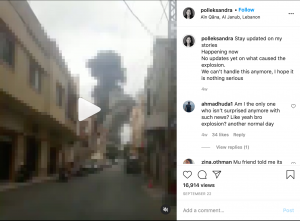
Olleksandra posts up to date information to her 89k followers almost like a news channel, demonstrating the creation of new infrastructures and new ways to communicate. All five of these activists reference excluding the mainstream media from their activities.
Ammounz posts much more about the emotional community experience. It is communicates an alternative or different way of being, and urges you to consider the non-tangible outcomes like a sense of empowerment and the feeling of belonging.
Gino Raidy is right there in the public spaces, creating new opportunity structures, engaging people in performative action, and making his followers feel like they are part of the process of change.
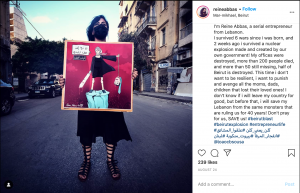
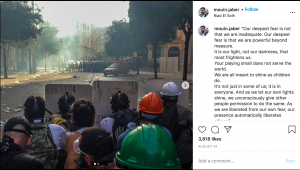
Selected as one of the World’s Most Powerful Arab Women, Reine posts a mixture of her own amazing art works and provocative photos of herself participating in the revolution!
Mouin posts from the ground with commentary about things like censorship, protests, the explosion and the coronavirus. He uses social media as a way to share knowledge about things like citizens rights if they are arrested, meeting times and places, and instructions for next steps.
Boaventura de Sousa Santos, Epistemologies of the South and the future, (2016, University of Coimbra)
Thomas Tufte, Communications and social change: a citizen perspective (2017)
Boaventura de Sousa Santos, Global order and Global knowledge, https://www.youtube.com/watch?v=P_A0YIuCcqI, (2013), accessed May 2020
Thomas Tufte, Communications and social change: a citizen perspective, https://www.youtube.com/watch?v=H5Ai4tOZIqo, (2017) accessed May 2020

